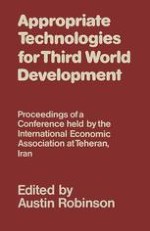1979 | Book
Appropriate Technologies for Third World Development
Proceedings of a Conference held by the International Economic Association at Teheran, Iran
Editor: Sir Austin Robinson, Professor
Publisher: Palgrave Macmillan UK
Book Series : International Economic Association Series
Included in: Professional Book Archive
